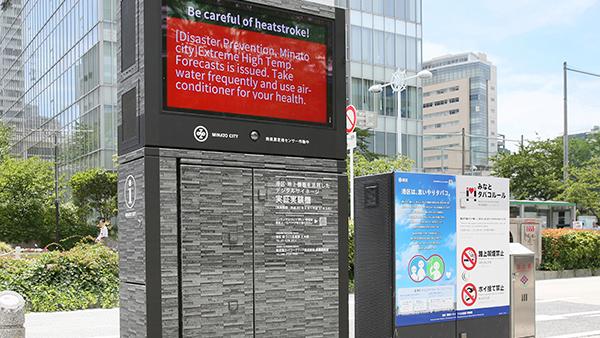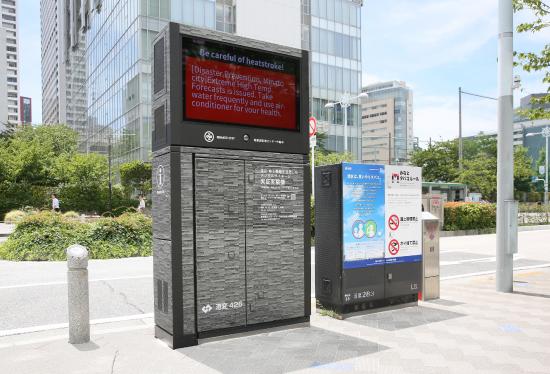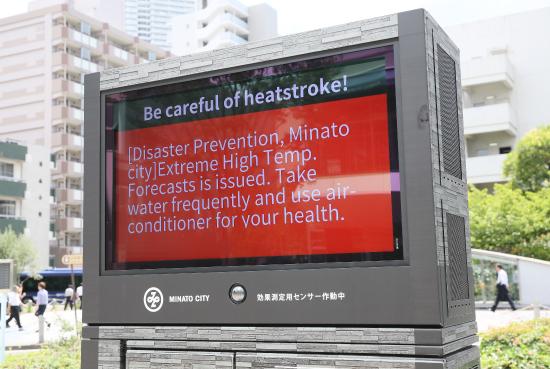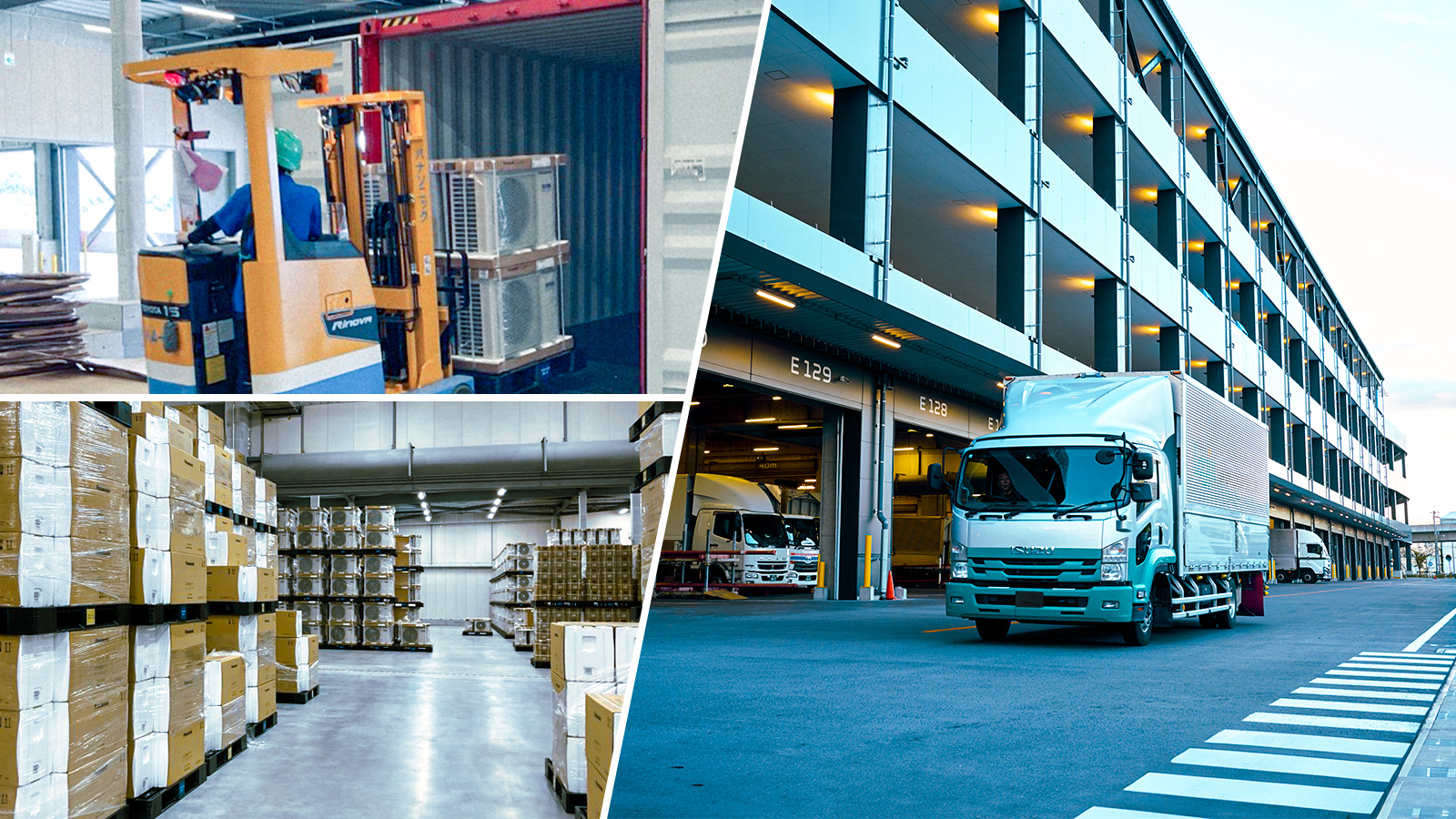
In order to increase the city's disaster prevention power and achieve a "safe city" where citizens can live in peace of mind, the city of Tokyo established the "Tokyo zero pole plan" in March 2018. Currently, the practical realization of the "Smart Street Solution," a collaborative project by Panasonic and Tokyo Electric Power Company, is also moving forward in tandem with this plan to achieve the multi-functional use of street spaces for the power distribution infrastructure after the utility poles are removed. The challenge to create a new style of urban development taken on by both companies is finally starting to take shape.
Summary of this article:
- The city of Tokyo plans to remove all utility poles along its prefectural roads within the core zones by 2019.
- Panasonic and Tokyo Electric Power Company have launched a collaborative project to achieve this goal.
- Signage displays will be installed on top of the ground equipment that will replace the utility poles, and provide a variety of information.
- There is a high possibility that the signage displays can also be used for media advertising and to provide information during emergencies.
Aiming to Develop Multi-Functional Uses for Street Spaces
The pillar of the "Tokyo zero pole plan" consists of completing the removal of utility poles along the prefectural roads within the center core area (inner lanes of the Central Circular Route) by 2019 and expanding the priority maintenance area to the inner area of Loop 7.
The removal of utility poles, specifically the underground installation of distribution lines, which is moving ahead together with the promotion of the plan, requires the installation of ground equipment to replace the utility poles. And it was Panasonic and Tokyo Electric Power Company that stepped up and focused on this "new distribution equipment."
In 2016, the two companies launched the "Smart Street Project" with the goal of creating multi-functional uses of street spaces for this distribution equipment (ground equipment) and promoting the development of safe, secure and convenient communities. The plan consists of installing signage displays on top of the ground equipment to utilize them as spaces to provide evacuation guidance during emergencies, information to visiting foreign tourists and to transmit information from local governments. The proposals to incorporate charging functions are also being discussed to enable visitors to charge their smartphones or electric cars.
Tetsu Shibuya from Panasonic Corporation explains the sequence of events leading up to the launch of the project as follows.
"We had been engaged in the outdoor signage business from before, but we felt that we were still behind in the informatization of roads in particular. One of the biggest reasons for this was that it was difficult to secure 'locations to place the necessary equipment.' At that time, we received a call from a representative of Tokyo Electric Power Company, with whom we have a close relationship, regarding their intent to not only purchase and sell electricity, but also to effectively utilize their power distribution equipment.
With the 'zero pole plan' currently underway in Tokyo, which has a completion target of 2020, the number of ground devices will also continue to increase in the near future. This served as a huge boost for us. We believed that if both companies worked together, we could accomplish many interesting things. And that was how we started the Smart Street project." (Mr. Shibuya)

Tetsu Shibuya, Chief of Project Promotion Section, Strategy Planning Department, Tokyo Olympic & Paralympic Enterprise Division, Panasonic Corporation
The Understanding of Local Residents Is Essential for Promoting the Reduction of Utility Poles
With the Smart Street project, the shared idea of "how to effectively utilize street spaces" led to the agreement of the joint planning and development, and the project is currently moving ahead as each side shares their knowledge and discusses how to proceed. The ideas developed from this project have also been submitted under the joint signature of the two companies during the patent application process.
To implement the solutions, Panasonic will develop and provide the signage displays and develop the mechanism for content distribution, and Tokyo Electric Power Company is in charge of improving and reforming the installation of the power distribution equipment.
However, the foundation for offering solutions will be the ground equipment. Masahiro Tanaka of TEPCO Power Grid, Inc. emphasized, "Since this will become a 'new social infrastructure,' finer consideration was required."
"The ground equipment will replace the utility poles, so naturally, they will contain the transformers that were previously installed onto the utility poles. If there were a malfunction, it may result in a major power outage for that region, so it is necessary to give ample consideration to the effect that this would have on the electromagnetic waves of the signage displays and ground vibrations. In areas near the ocean, countermeasures against salt damage are required. Considering the future spread of this equipment, it was also necessary to provide easy installation and maintenance. We needed to determine how we could procure the specifications for use as a new social infrastructure. This was a theme that had to be decided by the entire company." (Mr. Tanaka)

Masahiro Tanaka, Deputy General Manager of Business Development Office, TEPCO Power Grid, Inc.
Currently, approximately 30,000 ground equipment units have been installed in 20-40-meter intervals in the city. The main installation locations include prefectural roads and national highways, public squares in front of train stations and parks, but not all locations are areas that have had utility poles installed. If the reduction of utility poles continues to move ahead in the future, naturally there will be a need to install ground equipment in the center of residential areas that did not contain any equipment up until now.
"When the time comes, equipment that the local residents have never seen before will suddenly be installed in front of their homes. Unless we can obtain their understanding, the zero pole plan itself will not be able to move forward. Thanks to the signage displays, it will enable us to provide a wide range of information. We at Tokyo Electric Power Company are responsible for properly explaining the value of the Smart Street Solution to local residents and reach a consensus." (Mr. Tanaka)

Street signage displays can provide various types of information (ground equipment + signage displays)
The Various ICT Technologies in the Devices Enable the Provision of a Wide Range of Services
So what are the specific values that the Smart Street Solution offers?
First is the provision of information through the signage displays installed on top of the ground equipment. The content distribution systems (CMS) are provided by Panasonic, which for example, can consolidate content such as tourist information and disaster prevention information created by local governments in the company's cloud center and distribute them to the target signage displays. A situation is also considered whereby, in the event of a disaster, escape routes will be indicated to lead people home who are having difficulty finding the route.
Also, functions such as Bluetooth and Panasonic's original light ID technology (LinkRay) have made it possible to offer monitoring services and distribute coupons as part of the Smart Street Solution, and by using the power of the ground equipment, it is also possible to provide charging services for smartphones and electric cars for passing pedestrians and drivers.
"If the awareness of street signage displays (ground equipment + signage displays) increases, I think that there will come a time when using these types of services throughout the city will become commonplace." (Mr. Shibuya)

Enabling the charging of electric cars and smartphones throughout the city
Services Using Cameras and Iot Sensors Are Being Considered for the Future
In order to provide the Smart Street Solution, the two companies collaborated with Minato Ward to install street signage displays near the East Exit of JR Tamachi Station, and conducted a demonstration experiment starting on April 4, 2018, that will last until March 2019.
During normal times, the content shown on the signage displays consists of ward administration information and promotional videos for Minato Ward. During emergencies, such as when a photochemical smog warning is announced, the emergency information is broadcast in Japanese, English, Chinese and Korean. The broadcasting hours are from 5:00 AM until midnight of the following day, and the content can be interrupted for emergency broadcasts 24 hours a day.
Currently implementing the first sidewalk demonstration experiment in Japan in front of Tamachi Station in Minato Ward.

The device offers Japanese, English, Chinese and Korean guidance in the event of a weather disaster.
"We invited members of the town planning councils of local governments and real estate developers to take tours of the region and received many comments indicating 'that this was the kind of project they wanted to take part in.' If the mechanisms developed here were to be constructed solely by local governments, they would be required to do everything from securing locations to installing the equipment by themselves. However, by using the street signage displays, it can reduce those efforts and costs." (Mr. Shibuya)
This will enable the local governments and companies that are interested in using the signage displays to focus on the planning and production of the distributed content. However, there still remains a hurdle that must be overcome in order to distribute a wide range of content from the signage displays. And that is the Tokyo Metropolitan ordinance on outdoor advertising. Mr. Tanaka provided an explanation regarding this point as follows.
"Under the current city regulations, the displaying of commercial advertisements on the street is prohibited, and only public information can be broadcast. People viewing the displays would get bored seeing the same content everyday, so we hope to post news, weather forecasts and train operation information, but there is a need to display the names of the companies that provided the source of the information in order to ensure their authenticity. However, at the moment, this is considered to be a form of advertising. In 2020, many people from within Japan and overseas will visit Tokyo. So, we are planning on conducting street surveys and making efforts together with Minato Ward to approach the Tokyo authorities to 'promote the increasing amount of demand for signage displays and obtain approval to broadcast commercial advertisements.'" (Mr. Tanaka)

Pollen reports and weather information for the region where the signage display was installed can be displayed
The street signage displays themselves still have many other possibilities. The use of the displays is expected in various situations.
"Current street signage displays are equipped with cameras as sensors, and can estimate the number of visitors and the age and gender of the visitors using facial recognition. They can be used for evacuation guidance plans in the event of a disaster, and if the regulation to display commercial advertisements is lifted, they can be used for area marketing purposes. By means of demonstration tests, for example, we realized that a large number of people would view the content at the beginning of the month, but when the same information is displayed continuously, the number of viewers would drop dramatically within a few days. Also, when IoT sensors, such as vibration or noise sensors, are used to collect data for each area, they can be used to calculate real estate prices. By combining temperature, humidity, pollen, and other sensors, it is possible to provide residents with information on the safety, security, and comfort of living in each area. First of all, we will continue to work toward removing the regulations on commercial advertisements in order to carve out a 'new legacy' for street signage by the year 2020. After 2020, we hope to install a variety of IoT sensors to create new business." (Mr. Shibuya)

A motion detector is located under the screen. It is possible to estimate the age and gender of the visitors using facial recognition.
"We would like to sit down and talk with members of the town planning council and owners of stores located in shopping arcades who are interested in using these street signage displays to liven up their towns from the planning stage and work together to design signage displays that suit the atmosphere of their neighborhoods. Our efforts are still far from reaching the goal line." (Mr. Tanaka)
- Reproduced from the website "Mirai-kotohajime", by courtesy of Nikkei Business Publications, Inc.
# # #
- Disclaimer:
- We would like to note that Panasonic Newsroom is not a place to address personal Customer Service issues. Even though this is not the forum, Panasonic is always eager to resolve your concerns. Our local customer services contacts can be found at Global Support or you can see our list of Social Media Accounts to find the right channel for your queries and concerns.









